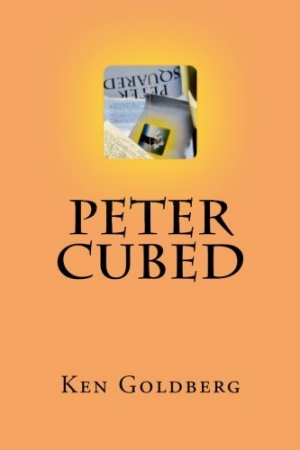Peter Cubed
Ken Goldberg’s second novel, Peter Cubed, delivers an existential adventure that strains the boundaries of taste with goofy scenes of sex and violence along with detailed forays into fantasy and the mechanics of sanity. Yet with this ambitious flight into metafiction, complete with awareness by the characters that they are literary inventions, Goldberg may have singed his wings.
Peter Cubed focuses mainly on three New Yorkers: Peter, a math-and-masturbation obsessive-compulsive; Anna, a Hasidic rape victim; and Herb, a civil-rights attorney with a history of alcoholism. When the three decide to get out of New York, they start a journey to escape their troubled pasts. It’s not a moment too soon. Readers have already been subjected many times to Peter’s intense, if humorous, masturbation and to Anna’s not-so funny self-mutilations. This is a book for mature readers only.
Out of New York, things get better. Yet in departing and escaping their distorted lives, Peter and Anna inadvertently go “off plot” and enrage their maker. This maker, by the way, is no God. He is their writer—a psychologist who once wrote a novel (called Peter Squared) that featured them and whose name happens to be the same as our author’s: Ken Goldberg. It soon becomes clear that this maker is no benevolent author. He writes his novel to satisfy his own sick fantasies: “This second volume is too damn much for me to do. I can’t focus on my patients and all I want to do is write plot, control people, have them masturbate and make them as crazy as I can.”
It could all work if it weren’t for a handful of significant flaws. The novel’s structure is unbalanced in a way that a story rooted in unreality should not be. If readers are to be shaken by the author’s inclusion of his own spirit (mockery or not), they should at least be given a smooth ride. Instead, the points of view shift inconsistently. While for the most part the writer takes care to keep individual perspectives in separate chapters or at least paragraphs, at times they bleed carelessly into each other.
Although it exhibits humor and originality, the text is marred with extraneous adverbs and repetitive language. The dialogue tends to be stilted, and conversations lean toward the expository. As a result, the long scenes, particularly those at the end of the novel, tend to outlive their purpose and do little for character development. Furthermore, Ken Goldberg (character) and his initial intrusions into Peter’s life via email become pointless, as do the repeated scenes of fantasy and sex. They interrupt the flow of a story that could be good, rollicking fun.
The desire to discover “why am I here?” is a central issue in literature and no less important to Goldberg. In his latest novel, he has succeeded in finding answers for his cast of characters. Not only are they characters in a book, their author is an unsuccessful writer who suffers for his craft. The situation is somewhat strained, but it packs a wallop. For Goldberg to be turning this mirror on himself, even in irony, takes genuine courage and a sense of humor—and that is no small achievement. Given a generous edit and a little restraint, Peter Cubed could pack a real punch for readers of comic novels and avant-garde literature.
Reviewed by
Leia Menlove
Disclosure: This article is not an endorsement, but a review. The publisher of this book provided free copies of the book and paid a small fee to have their book reviewed by a professional reviewer. Foreword Reviews and Clarion Reviews make no guarantee that the publisher will receive a positive review. Foreword Magazine, Inc. is disclosing this in accordance with the Federal Trade Commission’s 16 CFR, Part 255.

